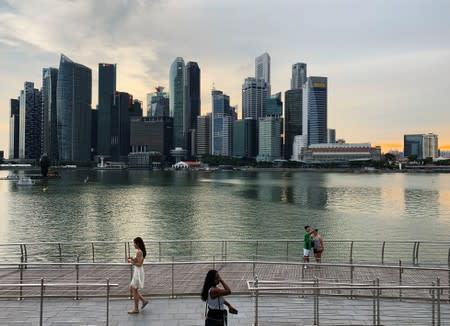By Aradhana Aravindan and Fathin Ungku
SINGAPORE (Reuters) - Last year, Singaporean chemicals factory boss Erman Tan took his employees on a cruise to the Malaysian island of Penang. This year, Tan says the best he can offer is to watch a video of the trip.
Singapore's economy is expected to grow at its slowest pace in a decade this year, and some experts are predicting a recession in 2020, as the U.S.-China trade war looks set to hit the export-reliant city-state harder than others in Southeast Asia.
This has prompted some economists to raise bets on the central bank easing monetary policy at its next meeting in October, or even out of cycle, especially if the U.S. Federal Reserve were to cut interest rates next month.
There is also speculation that the government could provide incentives to boost growth, but businesses like Tan's don't expect fiscal or monetary policy to be enough to arrest an economic decline that is mostly a result of a global slowdown.
"Many times you rely on yourself," said Tan, chief executive of Asia Polyurethane Manufacturing, which is cutting costs as customers in China hold back orders.
With revenues down 20 percent last year, his employees can forget about sailing around tropical islands.
"This year, we will watch the video like a virtual (experience). Let them put on goggles," he quipped.
To be sure, parts of the economy, such as construction and private consumption, have held up, supported by upward wage pressure from foreign worker restrictions and large long-term building projects.
But with exports equal to about 200% of Singapore's gross domestic product, a much larger weighting than those in neighbouring Malaysia and Indonesia, bumping up domestic consumption is unlikely to meaningfully boost growth.
Singapore must expect some fallout from global trade disruption, Prime Minister Lee Hsien Loong told reporters in Bangkok over the weekend.
"You cannot just step on the gas and speed up and make up for a less favourable external environment," Lee said.
The uncertainty is prompting businesses to cut costs as they prepare for a drawn-out battle between the world's two biggest economies.
"No one wants to invest now, because they want to see what happens in the trade war," said John Kong, chief executive of building materials supplier M Metal, which employs 64 people.
Kong has asked his workers to turn off air-conditioning units when they leave for lunch and to stop printing in colour.
NOT OUT OF THE WOODS
Singapore's economic data has been grim lately.


